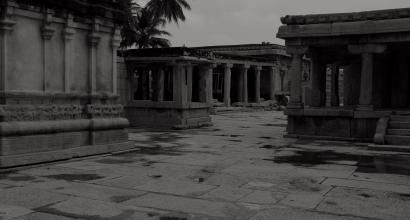Magnanimity of Seshadri Iyer
But Seshadri Iyer was a great person. He wouldn’t bring the political animosity to the personal relations. He had accepted the greatness of Venkatakrishnaiah wholeheartedly. Two or three of Seshadri Iyer’s children were dedicated students of Venkatakrishnaiah. While Krishna Iyer was the deputy commissioner, the recommendations of Venkatakrishnaiah were honored.
Venkatakrishnaiah was upbeat in providing letters of recommendation. He never said no to the one who asked. Many undeserving people also benefited this way.
Thoughtless recommendation
A complaint was raised on a misdeed of a high-level officer of a certain department. After an investigation, the official had to undergo forced retirement. That officer pleaded with Venkatakrishnaiah. This resulted in articles which proposed that the widely spoken wrong and unjust deeds of that officer were not true, that the officer was truthful, god-fearing, and clean-handed. It went on like this for a long time. This did not bear good results to the officer anyway. Then Venkatakrishnaiah sent a letter to the Dewan Visvesvaraya praising that officer. The Dewan responded and asked Venkatakrishnaiah to meet him face to face. I was also present in that meeting. After exchanging pleasantries, Visvesvaraya handed over a pile of papers to Venkatakrishnaiah. Venkatakrishnaiah read all of them in detail and placed the pile of papers on the table.
“See, he did not even mention all this to me. He is involved in a lot of things.”
Visvesvaraya said, “See, you created such a nuisance by publishing articles commending him in the paper and writing a letter to me. I have provided you a committee report. I have not seen more honest and distinguished people than the members of that committee. You will also consider this!”
Venkatakrishnaiah “how can I say no. They are all clean-handed and honest.”
Visvesvaraya “It is recommended that your friend needs to be prosecuted. I have blocked that prosecution procedure for your sake. Will proceed with the prosecution to get the truth out from court if further noise about that person is created”.
Venkatakrishnaiah mildly cursed that person and came out with a smile. Like Professor Venkatanarayanappa; Venkatakrishnaiah would first believe; once he got acquainted with the truth he would say “what a clever rascal!”.
Writings
Venkatakrishnaiah was a good scholar. He never publicized his intellect. He had thoroughly studied Sanskrit literature. His English was powerful and profound. His Kannada’s simplicity, elegance, and splendor were a model to be followed. From his Kannada writings, Lakshminarayanappa used to often quote from these two works; one ‘dhanārjaneya krama’ (How to earn money) and the other is ‘cora-grahaṇa-tantra’ (technique of catching theft). Lakshminarayanappa used to say this on the face of Venkatakrishnaiah. Venkatakrishnaiah would laugh heartily listening to this.
“People who know the formula for earning money will not come to newspaper business” was the first taunt of Lakshminarayanappa. “Closure of Padmalaya was an example for anyone wanting to earn in your way”. “Regarding theft and catching it, the money order you got based on donation; you signed the coupon, have you ever counted the money?” His way of catching theft was complimenting their way of earning money. Everyone knew about thieves among his press staff. When money orders came; whoever stayed closer would take the money as though it was their money. People who brought things to his office, home, the school were also cheating with the money given. Everyone knew about this except Venkatakrishnaiah. He never stopped addressing those thieves as “Oh! the great one”, “Oh! the noblest''.
Way of making money
Lakshminarayanappa practiced a safety measure. Whenever Venkatakrishnaiah would stay at Lakshminarayanappa’s place during his visit to Bangalore. When he would go back Lakshminarayanappa would come to the station, mark how much money is left in a sheet of paper, tie the sheet and money in a knot of the cloth’s edge (dhotra). Then he would stuff the knot in Venkatakrishnaiah’s fist and say “careful! Careful!”. Despite such precautions, full money would never reach Mysore. At Bidadi station if the bamboo stick seller advertises.
“How much is this oh! noble fellow.”
“Only three rupees Sir, it is fantastic.”
Three rupees were spent.
Then Banana at Ramanagara station. Four bananas would cost eight annas. Many a time a whole one rupee was given, and he would not ask for the change.
Once he got colored dolls and a top from Channapatna. Lakshminarayanappa asked.
“This is for whom.”
“Let it be, for the kids to play.”
“Who is there in this house to play with dolls.”
Venkatakrishnaiah pointed his hands towards me. I asked, “for me?”
“yes”
Another time khāra-būndi and laḍḍu packets were brought from Maddur. Lakshminarayanappa got angry and raised his voice. Venkatakrishnaiah said.
“Let the kid eat” and he put the heap in my hand.
This was his madness; there was no control over money. This was his way of earning money.
A place of charity
In the lifetime of Venkatakrishnaiah, personally, when he enjoyed rest and peace I do not know. In my fifty to sixty years of experience; it did not appear that he had a private life. His house was like a charitable trust. The place where he was seated was like a fair. To converse and to eat many would come and join. Acquaintances, unknown people, friends, frauds disguised as friends, students, the general public, officers, lawyers, scholars, teachers used to be there. No one knows who had what intentions. People with specific purposes were few. Many were without aim or purpose. From morning five to night ten, the same routine would happen. Without caring about eating time or sleeping time, the crowd came. The crowd used to be overwhelming during the times of Dasara and the birthday celebrations of Maharaja. I want to share an experience when he used to be at Padmalaya. About quarter to seven in the evening two or three people would be there. By seven it would have increased to five to six. Some of them were lawyers, one or two would be prominent people. Among them, someone would raise a matter related to some city. Using that as the pretext, “What injustice”, “No one to hear” he would complain. Some others would criticize some officials. This way screaming and scolding would continue till seven-thirty. Everyone would be offered upma and coffee. Then one by one would depart. This was those people ‘served’ their motherland.
It is not that Venkatakrishnaiah did not know about the quality of such people. Many friends used to get him into trouble, he was cognizant about this. He did not forget the attitude of people who escaped in nick of time. He never talked in a lighter vein about anyone, never complained, never disappointing others. He used to forgive all and respect all; I have come up with three reasons for his behavior. (1) He was a courteous character. By nature, he was soft. (2) People in the public domain should not have any adversaries. No one knows when who may be useful. (3) Each and every one should get a chance for self-correction. If one is scolded and chided, then he would become angry. An attitude of correction will be driven out by anger. Maybe these were the things driving him: he was always humble and confident. People have called him ‘dayāsāgara’ (the ocean of compassion) and Bhīṣmācarya. No one says those were uncalled for or exaggerated. But I would call him a storehouse of liquid jaggery. He was exploited by many in many ways.
This is the third part of the translation of the fifth essay in D V Gundappa’s magnum-opus Jnapakachitrashaale (Volume 6) – Halavu Sarvajanikaru. Edited by Raghavendra G S.











































